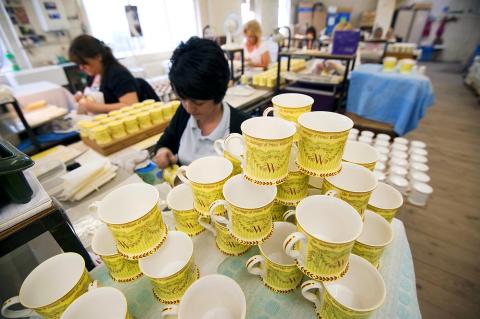Collectibles company Stanley Gibbons is poised to expand into Hong Kong to capitalize on the growing passion for stamp collecting among wealthy Chinese.
The UK company sees China as a key market and revealed on Friday that it could soon open an investment office in Hong Kong, the main center for philatelic dealing in the country. A similar move into Switzerland is also being considered.
Closer to home, it hopes for a big boost from the royal wedding next month and the 2012 Olympic games in London.

Photo: EPA
“The market is very strong over there [China], there are a number of old wealthy collectors and there are new people coming onto the market who are looking to invest in a part of China’s history. The same in India where the new wealthy are looking to buy back some of India’s history and stamps are a part of it,” company secretary Richard Purkis said.
BANNED TO BOOMING
There are 20 million collectors in China and 50,000 government-sponsored philatelic societies. While it was illegal to collect stamps under former Chinese leader Mao Zedong (毛澤東), since his death in 1976 there has been a boom in collecting.

Photo: EPA
“The Chinese market is expected to represent a key growth area benefiting from our development of internal expertise in rare stamps from China and from the key trading relationships built during 2010,” the firm said.
It started selling stamps and collectibles in China last year, the biggest stamp market in the world.
“Stanley Gibbons is the leading brand name in a market that is becoming increasingly global,” Peel Hunt analyst Charles Hall said.
The firm has relaunched its Web site and a new eBay-style site where collectors can trade stamps is due to go live later this year. Stanley Gibbons, which owns Fraser’s Autographs and Benham First Day Covers, is also beefing up its presence in the US, still the biggest collectibles market in the world.
ROYAL BOOST
Prince William and Kate Middleton’s big day is set to lead to a surge in sales of first day covers and other commemorative collectibles at the group’s recently acquired Benham business. A similar boost is expected from the London Olympics in 2012.
The wedding and the Olympics, along with prospects in China, added to the firm’s optimism, which noted that the market for rare stamps and signatures remains resilient, with both the GB30 Rarities Index and the Autograph 100 index rising 7 percent last year. Stanley Gibbons is still on the lookout for acquisitions in stamps and other collectibles. It made profits before tax and exceptional charges of £4.5 million (US$7.2 million) last year, up 8 percent on the previous year, and lifted its annual dividend by 10 percent to £0.055.

SEEKING CLARITY: Washington should not adopt measures that create uncertainties for ‘existing semiconductor investments,’ TSMC said referring to its US$165 billion in the US Taiwan Semiconductor Manufacturing Co (TSMC, 台積電) told the US that any future tariffs on Taiwanese semiconductors could reduce demand for chips and derail its pledge to increase its investment in Arizona. “New import restrictions could jeopardize current US leadership in the competitive technology industry and create uncertainties for many committed semiconductor capital projects in the US, including TSMC Arizona’s significant investment plan in Phoenix,” the chipmaker wrote in a letter to the US Department of Commerce. TSMC issued the warning in response to a solicitation for comments by the department on a possible tariff on semiconductor imports by US President Donald Trump’s

‘FAILED EXPORT CONTROLS’: Jensen Huang said that Washington should maximize the speed of AI diffusion, because not doing so would give competitors an advantage Nvidia Corp cofounder and chief executive officer Jensen Huang (黃仁勳) yesterday criticized the US government’s restrictions on exports of artificial intelligence (AI) chips to China, saying that the policy was a failure and would only spur China to accelerate AI development. The export controls gave China the spirit, motivation and government support to accelerate AI development, Huang told reporters at the Computex trade show in Taipei. The competition in China is already intense, given its strong software capabilities, extensive technology ecosystems and work efficiency, he said. “All in all, the export controls were a failure. The facts would suggest it,” he said. “The US

The government has launched a three-pronged strategy to attract local and international talent, aiming to position Taiwan as a new global hub following Nvidia Corp’s announcement that it has chosen Taipei as the site of its Taiwan headquarters. Nvidia cofounder and CEO Jensen Huang (黃仁勳) on Monday last week announced during his keynote speech at the Computex trade show in Taipei that the Nvidia Constellation, the company’s planned Taiwan headquarters, would be located in the Beitou-Shilin Technology Park (北投士林科技園區) in Taipei. Huang’s decision to establish a base in Taiwan is “primarily due to Taiwan’s talent pool and its strength in the semiconductor

French President Emmanuel Macron has expressed gratitude to Hon Hai Precision Industry Co (鴻海精密) for its plan to invest approximately 250 million euros (US$278 million) in a joint venture in France focused on the semiconductor and space industries. On his official X account on Tuesday, Macron thanked Hon Hai, also known globally as Foxconn Technology Group (富士康科技集團), for its investment projects announced at Choose France, a flagship economic summit held on Monday to attract foreign investment. In the post, Macron included a GIF displaying the national flag of the Republic of China (Taiwan), as he did for other foreign investors, including China-based